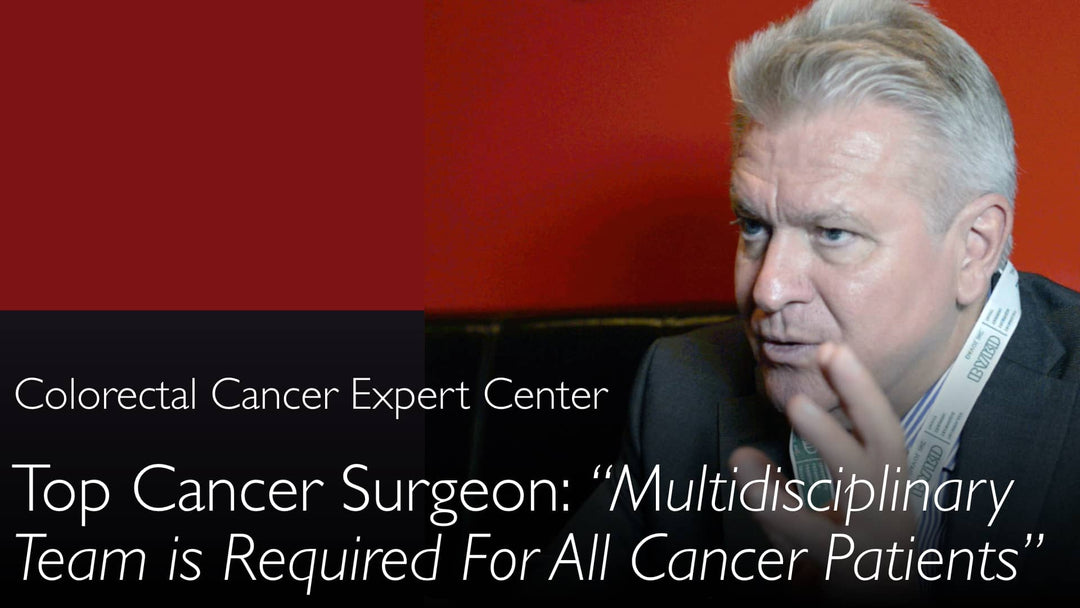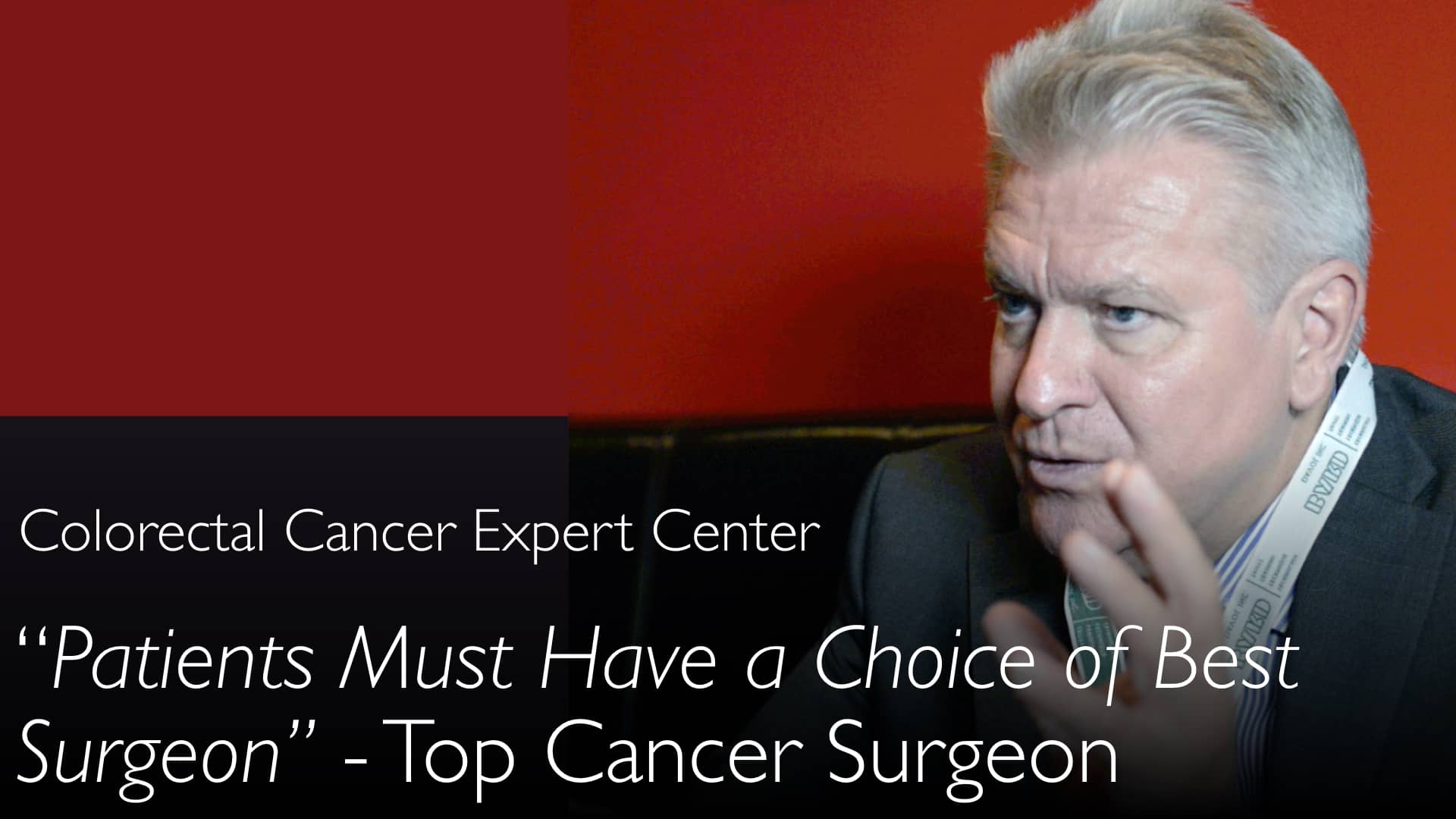Dr. Torbjorn Holm, MD, en førende ekspert inden for rektalkirurgi, forklarer, hvorfor en vurdering fra et multidisciplinært team (MDT) er ufravigelig for alle kræftpatienter. Han argumenterer for en fremtid, hvor patienter er velinformeret forbrugere, der aktivt vælger højvolumenskirurger og behandlingscentre for at opnå de bedste mulige resultater.
Optimering af rektalcancerbehandling: MDT’s afgørende rolle og patientens valg
Spring til afsnit
- Hvorfor et tværfagligt team er uundværligt
- Tilpasning af opfølgning til recidivrisiko
- Hvorfor højvolumenkirurgi er afgørende
- Patientens styrkelse: Fra passiv modtager til aktiv medspiller
- Systemiske barrierer for optimal behandling
- Fremtidens sundhedsvæsen er patientdrevet
- Værdien af en second opinion i kræftbehandling
Hvorfor et tværfagligt team er uundværligt
Moderne rektalcancerbehandling kræver en tværfaglig tilgang for hver enkelt patient. Dr. Torbjorn Holm, MD, understreger, at en kirurg ikke bør behandle rektalcancer uden først at have drøftet tilfældet på et MDT-møde (multidisciplinært team). Dette forum sikrer, at alle behandlingsbeslutninger, herunder behovet for kirurgi, træffes kollektivt af et team af specialister: kirurgiske onkologer, medicinske onkologer, stråleonkologer, radiologer og patologer.
Denne teambaserede strategi er en hjørnesten i onkologisk præcisionsmedicin. Den garanterer en omfattende behandlingsplan, der tager højde for alle aspekter af patientens unikke kræftprofil.
Tilpasning af opfølgning til recidivrisiko
En central styrke ved MDT-processen er dens evne til at stratificere patienter ud fra deres individuelle risiko for recidiv. Dr. Torbjorn Holm, MD, forklarer, at ikke alle rektalcancerpatienter har brug for samme intensitet af opfølgningspleje. Nogle har meget lav recidivrisiko og kan nøjes med minimal overvågning, mens andre med høj risiko kræver intensiv opfølgning.
Denne skræddersyede tilgang er mere effektiv og skåner patienter med lav risiko for unødvendige undersøgelser og bekymringer. MDT’en træffer disse afgørende beslutninger efter operationen og fastlægger den optimale opfølgningsstrategi for langvarig sundhed.
Hvorfor højvolumenkirurgi er afgørende
Ud over MDT’en er kirurgisk ekspertise altafgørende. Dr. Anton Titov, MD, og Dr. Torbjorn Holm, MD, understreger begge, at de bedste resultater opnås, når en kræftkirurg udfører et højt antal af en bestemt operation. For komplekse indgreb som rektalcankirurgi korrelerer kirurgens erfaring direkte med bedre patientudfald, herunder højere overlevelsesrater og færre komplikationer.
Patienter bør aktivt opsøge højvolumenkirurgiske enheder og kirurger, der specialiserer sig i deres kræfttype. Dette fokus på kirurgisk volumen er afgørende for at opnå excellence i kræftbehandling.
Patientens styrkelse: Fra passiv modtager til aktiv medspiller
Dr. Torbjorn Holm, MD, argumenterer for et paradigmeskift i patientens rolle – fra passiv modtager til aktiv, informeret medspiller. Han mener, at betegnelsen ”patient”, som antyder tålmodig afventning, er forældet. Fremtidens medicin involverer patienter, der kræver information, opsøger specialiserede enheder og insisterer på den bedst mulige behandling.
Denne styrkelse betyder, at patienter skal forstå, hvad der udgør ”det bedste” i kræftbehandling: en MDT-vurdering og en højvolumenkirurg. Dr. Holm mener, at denne proaktive tilgang vil forbedre sundhedsydelsen fundamentalt.
Systemiske barrierer for optimal behandling
På trods af den klare vej til optimal behandling, møder man ofte systemiske barrierer. Dr. Holm påpeger, at der i systemer som Sveriges ikke findes et frit sundhedsmarked. Regeringer sætter loft over, hvor mange operationer et hospital må udføre, hvilket begrænser patientens mulighed for at vælge et højvolumencenter.
Løsningen ifølge Dr. Torbjorn Holm, MD, er, at patientefterspørgslen driver forandring. Hvis patienter konsekvent vælger de bedste hospitaler, bør finansieringen følge med, hvilket tvinger mindre populære, lavvolumencentre til at forbedre sig eller lukke. Tilgængeligheden af behandling skal tilpasses patientens behov, ikke bureaukratiske kvoter.
Fremtidens sundhedsvæsen er patientdrevet
Samtalen med Dr. Anton Titov, MD, tegner et billede af en spændende fremtid for onkologien. Dr. Holm forestiller sig et system, hvor patienter bruger internettet og åbne resultatregistre til grundigt at undersøge deres muligheder. De vil være udstyret med data til at kræve henvisninger til specialister og centre med de bedste resultater.
Denne gennemsigtighed og adgang til information vil skabe et mere konkurrencedygtigt og kvalitetsorienteret sundhedsvæsen. Beslutningsmagten vil i stigende grad flytte fra lægerne til de informerede patienter.
Værdien af en second opinion i kræftbehandling
En medicinsk second opinion er et værdifuldt værktøj for patienter i dette nye paradigme. Den tjener to formål: at bekræfte, at en rektalcancerdiagnose er korrekt og fuldstændig, og at verificere, at den foreslåede behandlingsplan – inklusive kirurgi – er nødvendig og optimal.
At indhente en second opinion fra et andet multidisciplinært team på et specialiseret center hjælper patienter med at vælge den bedste behandling med tillid. Det er et proaktivt skridt, der passer perfekt til Dr. Holms vision om en styrket sundhedsforbruger, der tager styringen over eget behandlingsforløb.
Fuld transskription
Dr. Anton Titov, MD: Patienter skal kræve den bedste kræftbehandling. De bør være aktive forbrugere af sundhedsydelser.
Multidisciplinær teamvurdering af hver kræftpatient er altid nødvendig i moderne kræftbehandling.
Dr. Torbjorn Holm, MD: I dag bør man ikke behandle patienter med rektalcancer, medmindre man drøfter dem på et multidisciplinært teammøde (MDT-møde) før og efter operationen. Så kan man træffe beslutninger om, hvorvidt patienten har brug for yderligere behandling, og hvordan opfølgningen skal foregå.
Det er indlysende, at nogle patienter med rektalcancer har meget lav recidivrisiko. Måske behøver man slet ikke at følge dem. Andre har høj risiko og bør følges meget intensivt.
Alt dette bliver langt mere krævende i fremtiden. Derfor har man brug for multidisciplinære behandlingsteams og højvolumenkirurgiske enheder til rektalcancerpatienter.
Dr. Anton Titov, MD: Også initiativ og aktivitet fra patienterne ved opsøgning af den rigtige behandling. Patienter bør forstå værdien af at gå til en kræftkirurg med stor erfaring i den pågældende kirurgi.
Dr. Torbjorn Holm, MD: Så er der barrierer for den bedste rektalcancerbehandling. I det svenske sundhedssystem er der ikke noget frit marked. Patienter kan ikke frit vælge hospital.
Regeringen beslutter, hvor mange operationer hvert hospital må udføre årligt. Det er et problem. Men forhåbentlig vil patientefterspørgslen løse det i fremtiden.
Hvis patienter med rektalcancer ønsker at gå til et bestemt hospital, vil regeringen betale for det. Så vil hospitalet øge sin kapacitet. Hospitaler, der ikke er populære, bliver nødt til at lukke. Det håber jeg bliver fremtiden.
Tilgængeligheden af behandling skal tilpasses patientens behov. Det bør være patienterne, der beslutter, hvem der skal behandle dem – ikke lægerne, som hidtil.
Dr. Anton Titov, MD: Så patienter bør blive ægte forbrugere af sundhedsydelser. Udtrykket ”klient” eller ”forbruger” har haft negative konnotationer i medicinen, men det er forkert.
Dr. Torbjorn Holm, MD: For ”patient” betyder nogen, der venter tålmodigt. Sådan udvikler medicinen sig ikke. Fremtiden bliver helt anderledes.
Patienter vil kræve information, de vil kræve adgang til specialenheder, de vil kræve den bedste behandling. De vil finde de bedste muligheder på internettet og i åbne registre. Det bliver fremtiden.
Dr. Anton Titov, MD: Professor Holm, mange tak for en meget informativ samtale. Onkologien er et spændende felt.
Rektalcancer er en kompleks sygdom, men der er opnået meget, og som det fremgår af vores samtale, vil der ske endnu mere i fremtiden. Mange tak!
Dr. Torbjorn Holm, MD: Tak!





